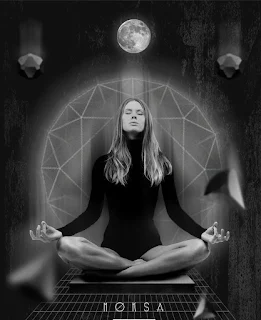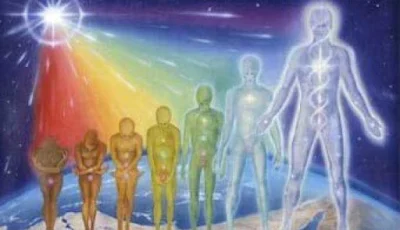Mayavadis are very fond of merging into the Supreme like rivers that come down and then disappear into the ocean by merging with it.
The impersonal way of merging into the Supreme is generally sought by people who are frustrated by the sufferings of material existence. When one is disillusioned from material life and wants to practice renunciation by giving up one's attachment to materialism, there is some leaning towards impersonalism, because of the frustration experienced in that hard struggle for existence.
Consequently those people consider the Supreme to be impersonal. And because they are too materially affected, the conception of retaining the personality after liberation from matter frightens them. When they are informed that spiritual life is also individual and personal, they become afraid of becoming persons again, so they naturally like to lose their individual existence and prefer a kind of merging into the impersonal void. This, however, is a kind of fearful stage of life, devoid of perfect knowledge of spiritual existence.
Moksa or liberation is neither a process of annihilating one's individuality as taught by the mayavadis (illusionists) nor does the living entity merge into the great "nothingness" as taught by the atheistic philosophy of the Buddhist nirvana.
Both of these types of impersonal philosophies teach some type of spiritual suicide. But since the spirit soul is eternal, it cannot be killed by an artificial process of spiritual suicide.
Liberation, as the word implies, is a process of liberating oneself from the false conception of materialistic life. After material cessation, there is the manifestation of spiritual life. In spiritual life the same distinction is there, the same individuality is there, but in pure consciousness, full knowledge and bliss.
Real liberation is, therefore, not an impersonal experience but the attainment of one's eternal spiritual body, free from the contamination of the materialistic ego.
Maya, or illusion, is the condition of spiritual life contaminated by material infection. Liberation from this material infection does not mean destruction of the original eternal position of the living entity. For example, if a person is bound by ropes then he is severely restricted in his free movement. However, when he is freed from his bonds he no longer is conditioned and can move freely wherever he likes. Therefore freedom from his conditioned state does not mean his personal destruction. Similarly liberation, or freedom, from material bondage [mukti] does not mean the destruction of the individual soul.
Mayavadis are confused by the flowery language of the vedas and compare themselves to little drops of water which dissolve when they merge in the ocean of water. Teaching the philosophy of dissolution they like to commit spiritual suicide by dissolving their individual existence.
Since the soul is sac-cid-ananda, or an eternal spiritual being, full of knowledge and bliss, it can never be annihilated or dissolved. The personalists, or devotees of the Lord, do not like to commit spiritual suicide by dissolving themselves. They prefer to keep their individuality and serve the Supreme Lord in a blissful and loving relationship called devotional service.
Those Mayavadis who compare themselves with water may artificially try to become water by merging into it, but the personalists or devotees enjoy this very same water by playing in it like fishes.
 Impersonalists also give the example of a river flowing into the ocean to merge with it. This may be a source of happiness for the impersonalist, but the personalist keeps his personal individuality like an aquatic in the ocean. We find so many living entities within the ocean, if we go below the surface. Surface acquaintance with the ocean's waves alone is not sufficient; one must have complete knowledge of the aquatics living below the waves in the ocean depths. The ocean can be compared to liberation, and the rivers to all the different paths of liberation. The impersonalists are dwelling in the river water which eventually comes to mix with the ocean. They have no information, however, that within the ocean, as within the rivers, there are innumerable living entities like fishes and other aquatic creatures. The devotees of the Supreme Lord are compared to sharks who live in that great ocean. The sharks who dwell in the ocean do not care for the little rivers which are gliding down into it. The devotees eternally live in the ocean of devotional service, and they do not care for the little rivers of impersonal liberation. In other words, those who are pure devotees always remain in the ocean of transcendental loving service to the Lord and have no business with the other processes, which are compared to the rivers that only gradually come to merge with the ocean.
Impersonalists also give the example of a river flowing into the ocean to merge with it. This may be a source of happiness for the impersonalist, but the personalist keeps his personal individuality like an aquatic in the ocean. We find so many living entities within the ocean, if we go below the surface. Surface acquaintance with the ocean's waves alone is not sufficient; one must have complete knowledge of the aquatics living below the waves in the ocean depths. The ocean can be compared to liberation, and the rivers to all the different paths of liberation. The impersonalists are dwelling in the river water which eventually comes to mix with the ocean. They have no information, however, that within the ocean, as within the rivers, there are innumerable living entities like fishes and other aquatic creatures. The devotees of the Supreme Lord are compared to sharks who live in that great ocean. The sharks who dwell in the ocean do not care for the little rivers which are gliding down into it. The devotees eternally live in the ocean of devotional service, and they do not care for the little rivers of impersonal liberation. In other words, those who are pure devotees always remain in the ocean of transcendental loving service to the Lord and have no business with the other processes, which are compared to the rivers that only gradually come to merge with the ocean.Real devotional liberation is defined as the reinstatement of the living entity in his own identity, his
own constitutional position. Every living entity is the part and parcel fragmental portion of the Supreme Lord and eternally related to Him. Therefore his constitutional position is the exchange of transcendental pleasures with the Lord. This natural transcendental pleasure is the ultimate goal of yoga and easily attainable through the process of bhakti-yoga.
For a devotee engaged in bhakti-yoga, liberation is attained automatically without any extra endeavour. This is because all the activities of the Supreme Lord (His Lila) are transcendental to the modes of the material energy. They are all attractive spiritual activities, and therefore constant association with the spiritual activities of the Supreme Lord gradually spiritualises the conditioned soul and ultimately severs the knot of material bondage. Liberation from material bondage is, therefore, a by-product of devotional service. The ultimate aim of liberation is to get release from material bondage and regain one's eternal existence in the spiritual world.







